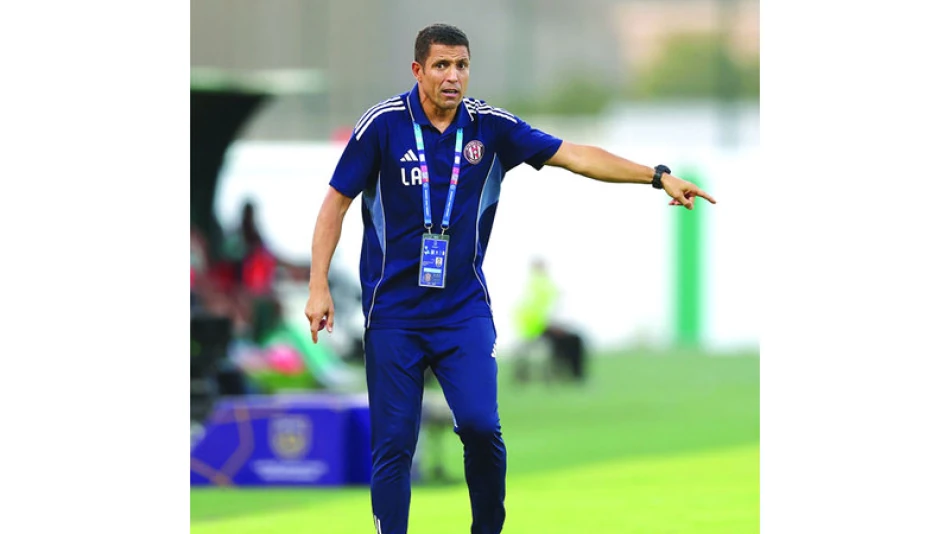
Dramatic Start to League: Fiery Debut, Furious Statement, and Amota's Dismissal
UAE Pro League Opens with Coaching Casualties and Referee Controversies
The inaugural round of the UAE's ADNOC Pro League delivered drama beyond the pitch, with Al Jazira swiftly firing their Moroccan coach after just one match and Al Ain launching a public attack on referees despite winning their opener. The opening week highlighted familiar patterns in Emirati football: trigger-happy club management and ongoing tensions with officiating standards.
Al Jazira's Lightning-Fast Coaching Change
Al Jazira's decision to dismiss Moroccan coach Hussein Ammouta following a 3-2 defeat to Khorfakkan exemplifies the ruthless approach UAE clubs take toward underperforming managers. The dismissal came less than 48 hours after the match, making it one of the fastest coaching casualties in league history.
This mirrors a troubling pattern. In the 2021-2022 season, Al Wasl fired Romanian coach Laurentiu Reghecampf after the opening round following a 4-1 loss to Bani Yas. The 2023-2024 season saw similar early exits, with Hatta dismissing Serbian coach Zeljko Markov after just two rounds, while Al Emirates parted ways with Mohammed Jalboot after three matches.
Market Impact on Coaching Stability
This revolving door approach reflects deeper structural issues within UAE football. The pressure for immediate results, combined with significant financial investments in foreign talent, creates an environment where patience becomes a luxury few coaches can afford. For international coaching talent, the UAE market offers high salaries but minimal job security.
Al Ain's Public Spat with Match Officials
Despite securing a 2-1 victory over Al Bataeh, Al Ain issued a scathing public statement criticizing VAR decisions that disallowed three goals. Two were ruled offside for Togolese striker Laba Kodjo, while a third by Moroccan Nassim Chadli was canceled due to a handball in the build-up.
The UAE Football Association responded with unprecedented force, issuing a strongly-worded statement rejecting any questioning of referee integrity and threatening "firm legal action" against clubs that inappropriately criticize officiating standards.
Regional Context of Referee Relations
This public confrontation reflects broader challenges facing Middle Eastern leagues in establishing referee authority. Unlike more established leagues where clubs typically handle disputes through private channels, the UAE's approach of public statements followed by institutional pushback creates unnecessary controversy that overshadows on-field action.
Shabab Al Ahli Maintains Opening Day Dominance
The reigning champions reinforced their reputation as the league's strongest opening-day performers, recording their sixth historically significant first-round result with a 2-0 victory over Al Dhafra. This continues a remarkable pattern dating back to 2012-2013, when they opened with a 6-3 win over Al Ain.
Their most impressive opening came in 2015-2016 with an 8-1 demolition of Fujairah, still the largest margin of victory in any league opener. This consistency in strong starts has become a psychological advantage, with opponents knowing they face a team that historically peaks early in seasons.
Statistical Performance Analysis
The opening round produced 19 goals across seven matches, averaging 2.71 goals per game—ranking as the fifth-lowest scoring opening week in league history. This defensive trend suggests tactical evolution toward more cautious approaches, contrasting with the 2012-2013 opener that averaged five goals per match.
International Player Integration Success
Portuguese midfielder Pedro Maleiro became only the second Portuguese player to score for Al Wasl, following Hugo Viana in 2015-2016. His 72nd-minute strike in the 2-0 victory over Bani Yas demonstrated the successful integration of new foreign talent.
Brazilian defender Adrilson Silva also impressed, scoring Al Wasl's opener from a corner kick, indicating that the club's summer recruitment strategy is already paying dividends. This successful integration of South American and European talent reflects the league's growing sophistication in player recruitment.
Looking Forward: Sustainability Concerns
The opening week's events highlight persistent challenges facing UAE football: coaching instability, referee-club relations, and the pressure for immediate results. While the league continues attracting quality international talent, the underlying structural issues around patience and long-term planning remain unaddressed.
For investors and football stakeholders, these patterns suggest a market still maturing in its approach to sustainable club management. The contrast between significant player investments and minimal coaching stability creates inefficiencies that ultimately impact competitive quality and fan engagement.
Most Viewed News

 Sara Khaled
Sara Khaled






